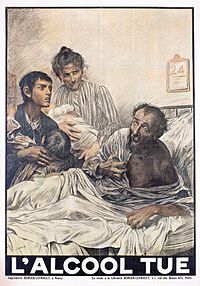
Photo from wikipedia
Delirium is a disorder of consciousness and a risk factor for cognitive dysfunction and poor prognosis. We hypothesized that preoperative gamma activities would be linked to postoperative delirium. We enrolled… Click to show full abstract
Delirium is a disorder of consciousness and a risk factor for cognitive dysfunction and poor prognosis. We hypothesized that preoperative gamma activities would be linked to postoperative delirium. We enrolled 71 subjects for elective surgery and recorded auditory steady-state response (ASSR) by electroencephalography (EEG) before the surgery and examined postoperative delirium with DSM-5. The EEG data were analyzed for baseline power, and ASSR evoked power (EP) and phase-locking factor (PLF) within the gamma range. Postoperative delirium was found in 18 patients (delirium group) but not in 53 patients (non-delirium group). There were no significant differences in the 40-Hz EP or PLF between the two groups. The baseline gamma activity negatively correlated with the 40-Hz PLF in the non-delirium group (ρ = −0.444, p < 0.01). The correlation between baseline gamma activity and 40-Hz EP was not significant in either the delirium or non-delirium group. In all patients, both preoperative PLF and EP had no significant correlations with the Delirium Rating Scale Revised-98 and the Memorial Delirium Assessment Measure at the post-operation, respectively. The disruption of the neurophysiological relationship between baseline gamma activity before sound stimuli and the PLF of the 40-Hz ASSR may be one of the potential neurophysiological indicators associated with postoperative delirium.
Journal Title: Journal of Personalized Medicine
Year Published: 2022
Link to full text (if available)
Share on Social Media: Sign Up to like & get
recommendations!